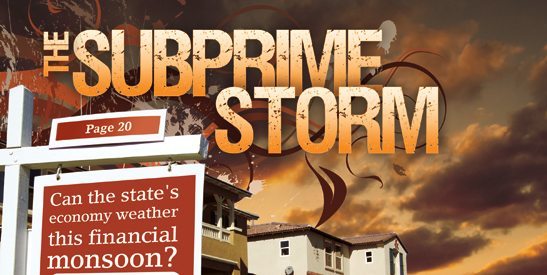Subprime Shake Out
Will a house of cards trump Arizona’s economy?
Fallout from the subprime mortgage lending mess is roiling Wall Street and roughing up the national economy. But in Arizona, at least so far, experts say its impact has been mostly psychological. “There is a perspective that we are in a crisis due to foreclosures of subprime mortgages and this is leading to gloom and doom, if not total doomsday,” says Lee McPheters, economics professor at the W.P. Carey School of Business at Arizona State University. “The numbers simply don’t back that up.”
McPheters says as of Sept. 30, according to the most recent numbers available from the Mortgage Bankers Association, Arizona was well below the national rate for seriously delinquent subprime mortgages (delinquent 90 days or in foreclosure). Arizona’s rate was 7.47 percent compared to 11.38 percent nationally.
“Arizona is not among the troubled states,” McPheters says. “However, there are troubled areas, particularly newly developed communities such as Maricopa, where there are many foreclosed properties for sale and prices have been affected.”
John Finnegan with Colliers International says there is an emotional aspect to subprime.
“The psychological effect subprime is having on our market is more damaging than the problem itself,” Finnegan says.
Homebuyers see eye-popping foreclosure headlines and then discover home prices aren’t as low as they expect, Finnegan says. Confused, they wait.
“I’ve heard subprime has knocked out 20 to 25 percent of the buying pool for homes,” Finnegan notes.
Although home construction and sales have dramatically slowed and prices are falling, Arizona’s housing market is relatively strong.
“It’s doing what it’s supposed to be doing, which is correcting itself,” Finnegan says.
Arizona last endured a significant housing downturn in the late 1980s and early 1990s, but experts say that was a true real estate depression. Today, the residential real estate sector is returning to a normal pace after years of hyperactivity, they say.
Larry Seay with Meritage Homes says most Arizonans with subprime mortgages can qualify for traditional mortgages and also can afford higher interest rates that kick in when lower introductory rates expire.
Subprime psychology also trickled into the commercial real estate market. Last summer, investors in Arizona commercial real estate were rattled by residential subprime problems nationally and pulled back from the market. Lenders tightened their credit standards and offers to buy property dropped by half, says Bob Young with CB Richard Ellis.
“We’re seeing some investors returning to the marketplace because they sense things are settling down,” Young says. He expects investor activity will pick up this year.
But there’s more than psychology at play. The dampened housing market has impacted office leasing and industrial space absorption in Phoenix. Relaxed mortgage lending standards were availed to borrowers of all types, and lenders have tightened their criteria, says Joe Biondo of Sunwest Mortgage. Now, Arizona’s mortgage brokers and title companies are consolidating or closing as loans default and business slows, he says.
“There has been a lot of office space leased by those companies over the years and we’re hearing that a good portion of it is coming back to the marketplace or being subleased,” says Rick Danis with Grubb & Ellis/BRE Commercial.
Most of the Valley’s leased industrial space is occupied by companies with ties to residential construction and Danis says that by third quarter 2007, industrial space absorption dropped by more than half from a record 7.8 million square feet in 2005. Housing is a catalyst for retail development and Danis says retail construction will slow.
However, Paul Boyle with Grubb & Ellis expects the commercial real estate market to do well this year.
“We may not be as vibrant as we have been in the past, but I look for things in commercial to continue to stay active,” he says.
But Arizona’s economy is cooling faster than expected, McPheters concedes. He cites four factors — the slow housing market; a loss of 20,000 residential construction jobs from third quarter 2006 to third quarter 2007; significantly declining consumer spending, particularly in areas that depend on a strong housing market; and the fact that Arizona is not benefiting from a national export boom fueled by the weak dollar.
“Arizona is no longer a top 10 growth state,” McPheters says.
Possibly making matters worse is the toll the subprime collapse is having on other parts of the nation. Arizona is accustomed to, indeed dependent on, having a large number of people move here from other states. McPheters says the inflow of new residents to Arizona could slow and have a negative impact on Arizona’s economy if people living in states with serious housing market slumps can’t sell their homes. If they can’t sell their homes, they probably won’t move to Arizona as planned. That’s one less potential buyer to help reduce the glut of homes in the Arizona market and one less person living, working and spending money in the state.
But, there are bright spots.
The state’s population is still growing and unemployment is lower than the national average. Arizona ranks first nationally in growth of personal-services jobs, second in tourism-related jobs and fourth in retail and wholesale trade jobs. Nonresidential construction remains strong. The state’s banking sector is weathering subprime, as well.
Tanya Wheeless, president of the Arizona Bankers Association, says Arizona banks are “healthy and certainly not near crisis.”
 More good news: Arizona State Treasurer Dean Martin says the state government has no investments in subprime mortgages. Plus, Arizona’s economy is diversified with wealthy retirees and service, high-tech, health care, manufacturing, communications and knowledge-oriented employment. Nevertheless,McPheters says there is a “specter of recession and a cloud of uncertainty” about the state’s economy.
More good news: Arizona State Treasurer Dean Martin says the state government has no investments in subprime mortgages. Plus, Arizona’s economy is diversified with wealthy retirees and service, high-tech, health care, manufacturing, communications and knowledge-oriented employment. Nevertheless,McPheters says there is a “specter of recession and a cloud of uncertainty” about the state’s economy.
“Arizona would not be immune to a national recession,” McPheters says. “If there is a national recession, theeconomic outlooks for Arizona would have to be recalibrated.”
www.brephoenix.com
www.cbre.com/phoenix
www.colliers.com
www.meritagehomes.com
www.thesunwestgroup.com





